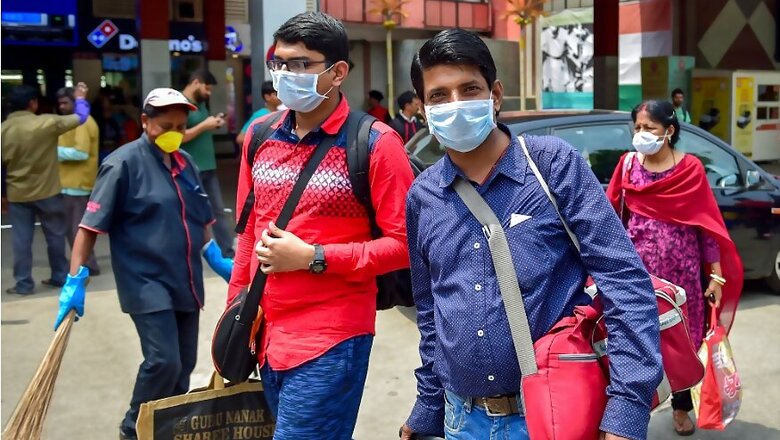With Infections on The Rise, Centre Invokes British-era Epidemic Act to Tackle Spread of Coronavirus

views
New Delhi: The central government has decided to invoke the Epidemic Act of 1897 to tackle the coronavirus crisis. The decision was taken after a meeting chaired by Cabinet Secretary Rajiv Gauba on Wednesday with representatives of the Indian Army, the Indo-Tibetan Border Police (ITBP) and other ministries.
"It was decided that all states/Union Territories should be advised by the Ministry of Health and Family Welfare to invoke the provisions of Section 2 of Epidemic Disease Act, 1897, so that all advisories being issued by the ministry/states/UTs are enforceable," said a statement issued by the government after the meeting.
The Epidemic Act is meant "to provide for the better prevention of the spread of dangerous epidemic diseases".
India on Wednesday reported 10 new cases of the coronavirus, taking the number to 60, said the Union Health Ministry said even as the country prohibited till March 31 the entry of international cruise ships, crew or passenger with a travel history to coronavirus-hit nations.
Section 2A of the Act empowers the central government to take steps to prevent the spread of an epidemic.
"When the central government is satisfied that India or any part thereof is visited by, or threatened with, an outbreak of any dangerous epidemic disease and that the ordinary provisions of the law for the time being in force are insufficient to prevent the outbreak of such disease or the spread thereof, the central government may take measures and prescribe regulations for the inspection of any ship or vessel leaving or arriving at any port in the territories to which this Act extends and for such detention thereof, or of any person intending to sail therein, or arriving thereby, as may be necessary," it says.
The British-era Act was mainly used to control plague in the late 1800s. Its provisions being invoked by the government now calls for fines and imprisonment in cases of violation. "Any person disobeying any regulation or order made under this Act shall be deemed to have committed an offence punishable under section 188 of the Indian Penal Code (45 of 1860 )," says Section 3 of the Act.
The law also protects officials who act under the provisions of this law. "No suit or other legal proceeding shall lie against any person for anything done or in good faith intended to be done under this Act," says Section 4 of the legislation.
Officials said the Act can be used to restrict movement of suspected coronavirus patients to prevent further spread of the disease. They said the need to invoke the Act was felt to empower the central government to tackle the outbreak.
"Health is a state subject, but by invoking Section 2 of the Epidemic Act, advisories and directions of the Ministry of Health and Family Welfare are enforceable across the country," they said.
A Group of Ministers (GoM) headed by Health Minister Harsh Vardhan on Wednesday also reviewed the preparedness in wake of the crisis. The meeting was attended by Minister of Civil Aviation Hardeep Puri, Minister of External Affairs S Jaishankar, Minister of State for Home Nityananda Rai, Minister of State for Shipping, Chemicals and Fertilisers Mansukh Mandaviya, and Minister of State for Health and Family Welfare Ashwini Kumar Choubey.
The central government also said that the powers executed by the Union Home Secretary under the Disaster Management Act have been "delegated" to his health ministry counterpart to enhance preparedness against the outbreak.
The Union Home Ministry order said the powers are exercised by the Union Home Secretary under Section 10 of the Act and he being the chairperson of the National Executive Committee (NEC).
The section talks about monitoring the implementation of the national plan and the plans prepared by the ministries or departments of the central government and gives overarching superintendence power to the officer executing it.
The latest order said these powers are being delegated to the Union Health Secretary to "enhance the preparedness and containment of novel coronavirus (COVID-19) and the other ancillary matters connected", adding that the order will be "deemed" to have come into effect from January 17.
As the cases of the infection continued to swell, with over 119,400 confirmed cases reported globally so far out of which over 4,300 people have succumbed to the virus, India prohibited entry of any international cruise ship, crew or passenger with a travel history to coronavirus-hit countries after February 1 to its major ports till March 31.
To prevent the spread of the virus, the Ministry of Shipping said it will allow only such international cruise ships which had intimated their call to ports by January 1. The government said international cruise ships will be allowed only at ports having thermal screening facilities for passengers and crew members.
(With inputs from PTI)

















Comments
0 comment